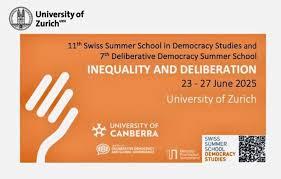
https://www.global.uzh.ch/en/global_university/global-activities/democracy-summe...
By Sophie Nakajima
Since 2014, the Swiss Summer School in Democracy Studies has brought together internationally renowned researchers and junior scholars from across the world for a week of intensive lectures and discussions on the complex challenges democracy faces today. The program offers young scholars the opportunity to deepen their theoretical, empirical, and methodological understanding and receive feedback on their research. It also enables them to engage with international peers and experts in a collegial and supportive environment, helping them build valuable contacts for their academic future.
The 2025 edition was a premier event, attracting 34 PhD students from 25 different countries, alongside 15 academic experts from 8 countries. This year’s theme was “Inequality and Deliberation”, addressing topics such as unequal participation and influence in deliberative forums, disparities in perceptions and engagement, the potential of deliberative processes to tackle systemic inequalities, and the need to integrate diverse cultural perspectives into deliberative theory and practice.
The summer school opened with a keynote lecture by Professor Cristina Lafont, the Harold H. and Virginia Anderson Professor of Philosophy at Northwestern University. Lafont spoke on deliberative minipublics and the struggle for political equality. Her talk called for institutionalizing minipublics that would empower citizens and strengthen democratic equality.
Each morning, internationally renowned scholars led interactive lectures and discussions. This was followed by workshops in the afternoons, in which participants presented their research projects and received feedback from faculty, moderators, and peers.
Professor Daniel Kübler from the Department of Political Science at UZH and one of this year’s organisers, believes the Swiss Summer School in Democracy Studies and Deliberative Democracy Summer School series are important as “they bring together current and future generations of democracy scholars from across the world to exchange ideas, challenge assumptions, and build lasting international networks that strengthen democratic research and practice.”
Signing of a Memorandum of Understanding
The presence of colleagues from the UC for the summer school provided a valuable opportunity to formalize a growing partnership with UZH through the signing of a Memorandum of Understanding (MoU). This agreement, between the UZH Faculty of Philosophy, Department of Political Science, Centre for Democracy Studies (ZDA) and the UC Centre for Deliberative Democracy and Global Governance, reflects a mutual commitment to academic cooperation and the strengthening of institutional ties.
Through the MoU, both universities aim to promote faculty and student exchanges, and support co-authored research and academic publications. They also aim to foster the exchange of ideas via joint seminars, conferences, and summer schools, and pursue collaborative research through joint grant applications.
This agreement is the sixth MoU that UZH has signed with an Australian university or faculty, including a strategic partnership agreement signed in 2021 with the University of Queensland. Together, these partnerships signal a growing appetite for exchange between Switzerland and Australia.
The collaboration with UC highlights the important role UZH has as the Leading House Asia-Pacific, a mandate recently granted by the State Secretariat for Education, Research and Innovation (SERI). In this role, UZH will promote and support scientific, educational, and innovation collaborations between Switzerland and 15 countries across the Asia-Pacific region, including Australia and New Zealand.
Under this mandate, UZH aims to build awareness and partnerships with key stakeholders, foster high-impact scientific collaboration, expand Swiss engagement in underrepresented or strategic geographics, and strengthen Switzerland’s visibility and positioning in the region.
To deliver on these goals, UZH will develop new funding instruments, with the first call for applications expected to be published in fall 2025, undertake stakeholder outreach activities and engage in science diplomacy initatives. These opportunities will be open to researchers from all Swiss universities, universities of applied sciences, universities of teacher education, and public research institutes.









